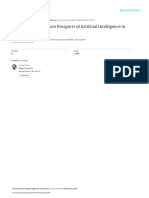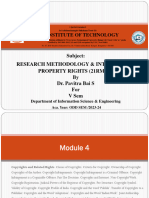0 ratings0% found this document useful (0 votes)
44 viewsModule 1 - AI - chp-1
The document discusses the history of artificial intelligence including important early research that laid the groundwork for AI such as Turing reformulating Goedel's results in 1936 and McCarthy coining the term 'Artificial Intelligence' in 1956. It then outlines several important developments in AI research from the 1950s through the 1990s including the creation of Lisp in 1958, the first game playing program in 1959, and Deep Blue beating Kasparov in 1997.
Uploaded by
IflaCopyright
© © All Rights Reserved
Available Formats
Download as PDF, TXT or read online on Scribd
0 ratings0% found this document useful (0 votes)
44 viewsModule 1 - AI - chp-1
The document discusses the history of artificial intelligence including important early research that laid the groundwork for AI such as Turing reformulating Goedel's results in 1936 and McCarthy coining the term 'Artificial Intelligence' in 1956. It then outlines several important developments in AI research from the 1950s through the 1990s including the creation of Lisp in 1958, the first game playing program in 1959, and Deep Blue beating Kasparov in 1997.
Uploaded by
IflaCopyright
© © All Rights Reserved
Available Formats
Download as PDF, TXT or read online on Scribd
You are on page 1/ 19
|| Jai Sri Gurudev||
Sri Adichunchanagiri Shikshana Trust (R)
SJB INSTITUTE OF TECHNOLOGY
(Affiliated to Visvesvaraya Technological University, Belagavi& Approved by AICTE, New Delhi.)
No. 67, BGS Health & Education City, Dr. Vishnuvardhan Road Kengeri, Bengaluru – 560 060
Subject: Artificial Intelligence and Machine Learning
(21CS54)
By
Yamuna U,
Assistant Professor
5th ‘A ’
Department of Information Science & Engineering
Aca. Year: ODD SEM /2023-24
Chapter-1
1.1 What is AI?
1.2 Foundation of AI
1.3 History of AI
History of AI:
Important research that laid the groundwork for AI:
•In 1931, Goedel layed the foundation of Theoretical Computer Science1920-30s:
He published the first universal formal language and showed that math itself is
either flawed or allows for unprovable but true statements.
•In 1936, Turing reformulated Goedel’s result and church’s extension thereof.
•In 1956, John McCarthy coined the term "Artificial Intelligence" as the topic of
the Dartmouth Conference, the first conference devoted to the subject.
•In 1957, The General Problem Solver (GPS) demonstrated by Newell, Shaw &
Simon
•In 1958, John McCarthy (MIT) invented the Lisp language.
• In 1959, Arthur Samuel (IBM) wrote the first game-playing program, for
checkers, to achieve sufficient skill to challenge a world champion.
• In 1963, Ivan Sutherland's MIT dissertation on Sketchpad introduced the idea of
interactive graphics into computing.
• In 1966, Ross Quillian (PhD dissertation, Carnegie Inst. of Technology; now
CMU) demonstrated semantic nets
•In 1967, Dendral program (Edward Feigenbaum, Joshua Lederberg,
Bruce Buchanan, Georgia Sutherland at Stanford) demonstrated to
interpret mass spectra on organic chemical compounds. First successful
knowledge-based program for scientific reasoning.
•In 1967, Doug Engelbart invented the mouse at SRI
•In 1968, Marvin Minsky & Seymour Papert publish Perceptrons,
demonstrating limits of simple neural nets.
• In 1972, Prolog developed by Alain Colmerauer. In Mid 80’s, Neural
Networks become widely used with the Backpropagation algorithm
(first described by Werbos in 1974).
•1990, Major advances in all areas of AI, with significant demonstrations
in machine learning, intelligent tutoring, case-based reasoning, multi-
agent planning, scheduling, uncertain reasoning, data mining, natural
language understanding and translation, vision, virtual reality, games, and
other topics
• In 1997, Deep Blue beats the World Chess Champion Kasparov
•In 2002,iRobot, founded by researchers at the MIT Artificial Intelligence
Lab, introduced Roomba, a vacuum cleaning robot. By 2006, two
million had been sold.
You might also like
- Brian Tracy No Excuses Power of Self-Discipline100% (1)Brian Tracy No Excuses Power of Self-Discipline4 pages
- Karen E. Rodman - Asperger's Syndrome and Adults. Is Anyone Listening (Stories)100% (2)Karen E. Rodman - Asperger's Syndrome and Adults. Is Anyone Listening (Stories)188 pages
- Self-Learning Module For Grade 11: Chapter Iv: Estimation of ParametersNo ratings yetSelf-Learning Module For Grade 11: Chapter Iv: Estimation of Parameters88 pages
- Download full (Ebook) Integration of Swarm Intelligence and Artificial Neural Network by Satchidananda Dehuri, Susmita Ghosh, Sung-Bae Cho (Editors) ISBN 9789814280143, 9814280143, B00H9IDB6G ebook all chapters100% (3)Download full (Ebook) Integration of Swarm Intelligence and Artificial Neural Network by Satchidananda Dehuri, Susmita Ghosh, Sung-Bae Cho (Editors) ISBN 9789814280143, 9814280143, B00H9IDB6G ebook all chapters76 pages
- The Intellectual History of AI: CS158-2: Introduction To Artificial Intelligence 4 Term AY 2019-2020No ratings yetThe Intellectual History of AI: CS158-2: Introduction To Artificial Intelligence 4 Term AY 2019-202041 pages
- Buy ebook Integration of Swarm Intelligence and Artificial Neural Network 1st Edition Satchidananda Dehuri cheap price100% (17)Buy ebook Integration of Swarm Intelligence and Artificial Neural Network 1st Edition Satchidananda Dehuri cheap price60 pages
- Artificial Intelligence & Machine Learning Digital Notes100% (1)Artificial Intelligence & Machine Learning Digital Notes116 pages
- Fundamentals of Artificial IntelligenceNo ratings yetFundamentals of Artificial Intelligence26 pages
- Artificial Intelligence: Spring 2008, Juris VīksnaNo ratings yetArtificial Intelligence: Spring 2008, Juris Vīksna67 pages
- Innovations in Intelligent Machines 1 - Javaan Singh Chahl Et Al (Eds)No ratings yetInnovations in Intelligent Machines 1 - Javaan Singh Chahl Et Al (Eds)277 pages
- Module 1 Problem Solving Search Lecture Notes. 16861418577271No ratings yetModule 1 Problem Solving Search Lecture Notes. 1686141857727164 pages
- Artificial General Intelligence: Patrick Hammer Marjan Alirezaie Claes StrannegårdNo ratings yetArtificial General Intelligence: Patrick Hammer Marjan Alirezaie Claes Strannegård380 pages
- zT5Szv9yT02k3sMtQ4LL - Preparing National Research Ecosystems For AI 5No ratings yetzT5Szv9yT02k3sMtQ4LL - Preparing National Research Ecosystems For AI 576 pages
- A8702_Artificial-Intelligence-ALL_NotesNo ratings yetA8702_Artificial-Intelligence-ALL_Notes113 pages
- Introduction To Artificial Intelligence: Session 1 2015/2016:W.R.W OMARNo ratings yetIntroduction To Artificial Intelligence: Session 1 2015/2016:W.R.W OMAR33 pages
- Civil Engineering Societal Global ImpactNo ratings yetCivil Engineering Societal Global Impact205 pages
- AI Hisrtory: Abhay Kumar Assoc. Prof NIFT, PatnaNo ratings yetAI Hisrtory: Abhay Kumar Assoc. Prof NIFT, Patna17 pages
- + (2024) - Reviews and Perspectives in Neuromorphic Engineering Novel Neuromorphic Computing ApproachesNo ratings yet+ (2024) - Reviews and Perspectives in Neuromorphic Engineering Novel Neuromorphic Computing Approaches3 pages
- (Ebook) Principles of Artificial Neural Networks by Daniel Graupe ISBN 9789814522731, 9814522732 pdf download100% (1)(Ebook) Principles of Artificial Neural Networks by Daniel Graupe ISBN 9789814522731, 9814522732 pdf download35 pages
- Embodied Computing: Wearables, Implantables, Embeddables, IngestiblesFrom EverandEmbodied Computing: Wearables, Implantables, Embeddables, IngestiblesNo ratings yet
- Narrative Report On Reading RemedialdocxNo ratings yetNarrative Report On Reading Remedialdocx3 pages
- Value As A Moderator in Subjective Well-Being: Shigehiro Oishi Ed Diener Eunkook Suh Richard E. LucasNo ratings yetValue As A Moderator in Subjective Well-Being: Shigehiro Oishi Ed Diener Eunkook Suh Richard E. Lucas28 pages
- (AC-S08) Week 08 - Pre-Task - Quiz - Weekly Quiz - INGLES IV (34349)No ratings yet(AC-S08) Week 08 - Pre-Task - Quiz - Weekly Quiz - INGLES IV (34349)5 pages
- Bringing Mobile Phones at School For Academic, Research and Other SchoolworksNo ratings yetBringing Mobile Phones at School For Academic, Research and Other Schoolworks8 pages
- Guideline For Final Year B.E. Project & PMMS Activities: (Semester VII and VIII)No ratings yetGuideline For Final Year B.E. Project & PMMS Activities: (Semester VII and VIII)71 pages
- Designing An Aviation English Instructors Training CourseNo ratings yetDesigning An Aviation English Instructors Training Course2 pages
- Effect of E - Learning On Student'S Academic Performance at College LevelNo ratings yetEffect of E - Learning On Student'S Academic Performance at College Level5 pages
- Personal Details: Name: Michelle Lim Date of Birth: 16.08.1997 Mobile: + 61 (04) 20794577No ratings yetPersonal Details: Name: Michelle Lim Date of Birth: 16.08.1997 Mobile: + 61 (04) 207945772 pages
- National News (Print) : 1st Place - Innocent Anguyo, John Semakula, Fred Turyakira, Godfrey Ojore, Jolly Owiny, Ali Mao and Richard Drasimaku, New VisionNo ratings yetNational News (Print) : 1st Place - Innocent Anguyo, John Semakula, Fred Turyakira, Godfrey Ojore, Jolly Owiny, Ali Mao and Richard Drasimaku, New Vision2 pages
- Application Checklist: (Please Tick For Documents Submitted)No ratings yetApplication Checklist: (Please Tick For Documents Submitted)2 pages
- Karen E. Rodman - Asperger's Syndrome and Adults. Is Anyone Listening (Stories)Karen E. Rodman - Asperger's Syndrome and Adults. Is Anyone Listening (Stories)
- Self-Learning Module For Grade 11: Chapter Iv: Estimation of ParametersSelf-Learning Module For Grade 11: Chapter Iv: Estimation of Parameters
- Download full (Ebook) Integration of Swarm Intelligence and Artificial Neural Network by Satchidananda Dehuri, Susmita Ghosh, Sung-Bae Cho (Editors) ISBN 9789814280143, 9814280143, B00H9IDB6G ebook all chaptersDownload full (Ebook) Integration of Swarm Intelligence and Artificial Neural Network by Satchidananda Dehuri, Susmita Ghosh, Sung-Bae Cho (Editors) ISBN 9789814280143, 9814280143, B00H9IDB6G ebook all chapters
- The Intellectual History of AI: CS158-2: Introduction To Artificial Intelligence 4 Term AY 2019-2020The Intellectual History of AI: CS158-2: Introduction To Artificial Intelligence 4 Term AY 2019-2020
- Buy ebook Integration of Swarm Intelligence and Artificial Neural Network 1st Edition Satchidananda Dehuri cheap priceBuy ebook Integration of Swarm Intelligence and Artificial Neural Network 1st Edition Satchidananda Dehuri cheap price
- Artificial Intelligence & Machine Learning Digital NotesArtificial Intelligence & Machine Learning Digital Notes
- Artificial Intelligence: Spring 2008, Juris VīksnaArtificial Intelligence: Spring 2008, Juris Vīksna
- Innovations in Intelligent Machines 1 - Javaan Singh Chahl Et Al (Eds)Innovations in Intelligent Machines 1 - Javaan Singh Chahl Et Al (Eds)
- Module 1 Problem Solving Search Lecture Notes. 16861418577271Module 1 Problem Solving Search Lecture Notes. 16861418577271
- Artificial General Intelligence: Patrick Hammer Marjan Alirezaie Claes StrannegårdArtificial General Intelligence: Patrick Hammer Marjan Alirezaie Claes Strannegård
- zT5Szv9yT02k3sMtQ4LL - Preparing National Research Ecosystems For AI 5zT5Szv9yT02k3sMtQ4LL - Preparing National Research Ecosystems For AI 5
- Introduction To Artificial Intelligence: Session 1 2015/2016:W.R.W OMARIntroduction To Artificial Intelligence: Session 1 2015/2016:W.R.W OMAR
- + (2024) - Reviews and Perspectives in Neuromorphic Engineering Novel Neuromorphic Computing Approaches+ (2024) - Reviews and Perspectives in Neuromorphic Engineering Novel Neuromorphic Computing Approaches
- (Ebook) Principles of Artificial Neural Networks by Daniel Graupe ISBN 9789814522731, 9814522732 pdf download(Ebook) Principles of Artificial Neural Networks by Daniel Graupe ISBN 9789814522731, 9814522732 pdf download
- Embodied Computing: Wearables, Implantables, Embeddables, IngestiblesFrom EverandEmbodied Computing: Wearables, Implantables, Embeddables, Ingestibles
- Value As A Moderator in Subjective Well-Being: Shigehiro Oishi Ed Diener Eunkook Suh Richard E. LucasValue As A Moderator in Subjective Well-Being: Shigehiro Oishi Ed Diener Eunkook Suh Richard E. Lucas
- (AC-S08) Week 08 - Pre-Task - Quiz - Weekly Quiz - INGLES IV (34349)(AC-S08) Week 08 - Pre-Task - Quiz - Weekly Quiz - INGLES IV (34349)
- Bringing Mobile Phones at School For Academic, Research and Other SchoolworksBringing Mobile Phones at School For Academic, Research and Other Schoolworks
- Guideline For Final Year B.E. Project & PMMS Activities: (Semester VII and VIII)Guideline For Final Year B.E. Project & PMMS Activities: (Semester VII and VIII)
- Designing An Aviation English Instructors Training CourseDesigning An Aviation English Instructors Training Course
- Effect of E - Learning On Student'S Academic Performance at College LevelEffect of E - Learning On Student'S Academic Performance at College Level
- Personal Details: Name: Michelle Lim Date of Birth: 16.08.1997 Mobile: + 61 (04) 20794577Personal Details: Name: Michelle Lim Date of Birth: 16.08.1997 Mobile: + 61 (04) 20794577
- National News (Print) : 1st Place - Innocent Anguyo, John Semakula, Fred Turyakira, Godfrey Ojore, Jolly Owiny, Ali Mao and Richard Drasimaku, New VisionNational News (Print) : 1st Place - Innocent Anguyo, John Semakula, Fred Turyakira, Godfrey Ojore, Jolly Owiny, Ali Mao and Richard Drasimaku, New Vision
- Application Checklist: (Please Tick For Documents Submitted)Application Checklist: (Please Tick For Documents Submitted)





































































































